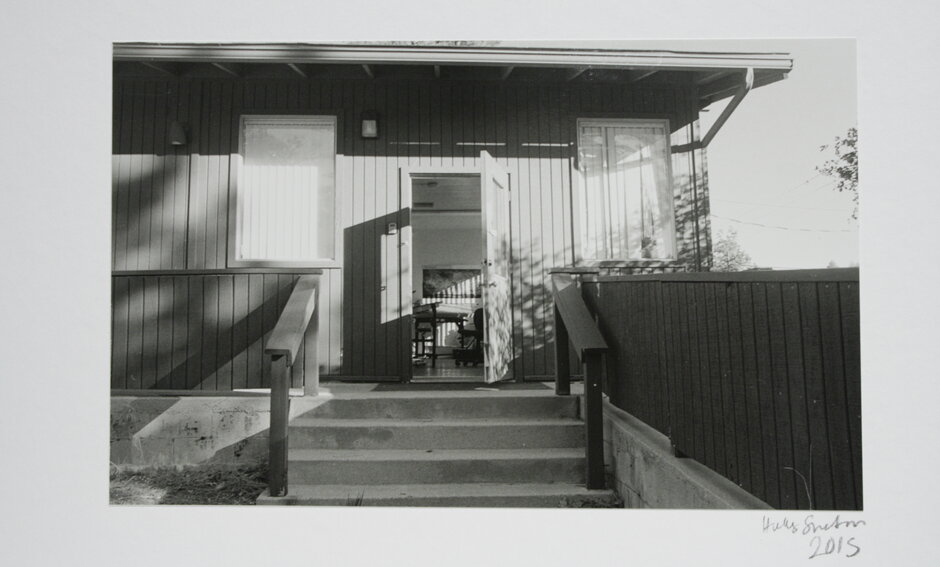Mr. Anand claimed that if the world grew quiet for even a single moment, we would hear the footsteps of the Great Mother. Ira, he called her. Ira Devi. But my thick New Yorker tongue, in all its nine years of inelegance, could never bring out the softened trill in ‘Ira’. We would try for hours to rediscover the sideways lilt and the softened vowels of his accent. But the voice that came so naturally to him made my warbling American throat a clothed imposter. So it was Mr. Anand, while trying desperately to keep a straight face, who suggested I call her The Lady Downstairs.
We spent those evenings on the stairwell that lead to the front door of our apartment complex, where redbrick met with the sun-stained streets of Jericho. My head rested against the seventh stair with my feet swinging off the ninth. There was some clarity in staring at a city that whistled by us, that arrogantly wrapped itself within the fiction of consciousness. But Mr. Anand and I knew that the streets, with all their oil stains and car crashes and racket, were sound asleep.
Listen, he said. And we would, until the clatter of a dangling world blurred into a dull roar. He would close his eyes, and I would too. For a second, I could feel every bone in my body, every eyelash pulsing with the ghost of some forgotten instinct. The winds ceased to dance. The sky would exhale. When I opened my eyes, I would murmur, someone was here. Mr. Anand smiled back. Yes, someone was here. The Lady Downstairs. An the sun would dissolve, as though on cue, behind the diner two blocks away.
It was with Mr. Anand that I tasted my first cup of real chai. My mother and father, who opted for the convenience of QuikTea, never bothered with spices and cane sugar. Mr. Anand, however, ground his own garam masala from fennel and bay leaves. After one taste, I knew that my tongue would never forgive the flavorless, sugary water that my parents preferred. Instant tea, like my Indian accent, was shakily unsure of what it was supposed to be. But a steaming cup of chai was so confident in its existence that the liquid sung as it gurgled down my throat. I make chai from the earth. From what she gives us, Mr. Anand explained. From The Lady Downstairs?
From The Lady Downstairs.
My parents treated the greying Indian man one apartment across with a cloaked unease. They were grateful for the hours we spent together before one of them came home from work. But the crimson toran hanging on Mr. Anand’s door was a silent red flag between them. My parents were ‘wallflower’ Indians who lost their accents to keep their jobs. Delhi was a photograph in my father’s wallet, a pair of earrings on my mother’s nightstand. They forced smiles during the offhand conversation, but I could see my mother’s eyes harden when Mr. Anand called her Parvati instead of some Anglicized distortion.
Autumn came. And as those summer evenings descended into the horizon, they took two towers with them. I remember the frantic phone calls, the wail of sirens crackling against our screen door. My mother sunk lifelessly into the sofa as the television blared.
Parv, my father murmured. You need to eat something. But she didn’t. Her eyes were fixed on the bodies ablaze, on the screams coiling into television static. I remember those hours we spent, a porcelain family, almost able to touch a splintering country through the telechrome. Mr. Anand had once told me something, and it burned in my brain. We live in the Kalyug, the Dark Age. Those words prickled in the television volume, an echo of those wounded faces. I would never forget those men who crawled out out of melted cars, carrying bloodied bodies on their backs. They had those hunted eyes — eyes in silent agreement that yes, this is the Kalyug, the Dark Age.
Mr. Anand was shot three weeks later. My father swept me into his arms as though it was I who had borne the bullet. It happened outside the grocery he used to frequent, where he would buy cinnamon and fresh ginger and tell the cashier to keep the change. The nearby 7/11 owned by the Guptas was burned to the ground, and all I could hear was Mr. Anand, over and over, reminding me that this was a Dark Age. Those words grew colder every time until I found myself sitting on that stairwell, staring at a hollow street. Mr. Anand’s relatives were moving his furniture into a white U-Haul. For a moment, I desperately hoped they would forget the red toran swaying against his front door. It could live a fragile life of its own, suspended only by a fraying string. But when I blinked, the toran was gone.
She’s awake now, I whispered. The city was alive, and so was I — the two of us momentarily silenced. And for the first time, I felt the footsteps of Ira Devi against the blackened earth, louder and louder until they swallowed the sun. The Lady Downstairs?
The Lady Downstairs.
Kanchan Naik is a junior at The Quarry Lane School in Dublin and the Teen Poet Laureate for the City of Pleasanton. When she’s not doodling or writing poetry, she is most likely untangling her earphones or looking for something that happens to be — much like herself — lost.
visual art by Holly Shelton

